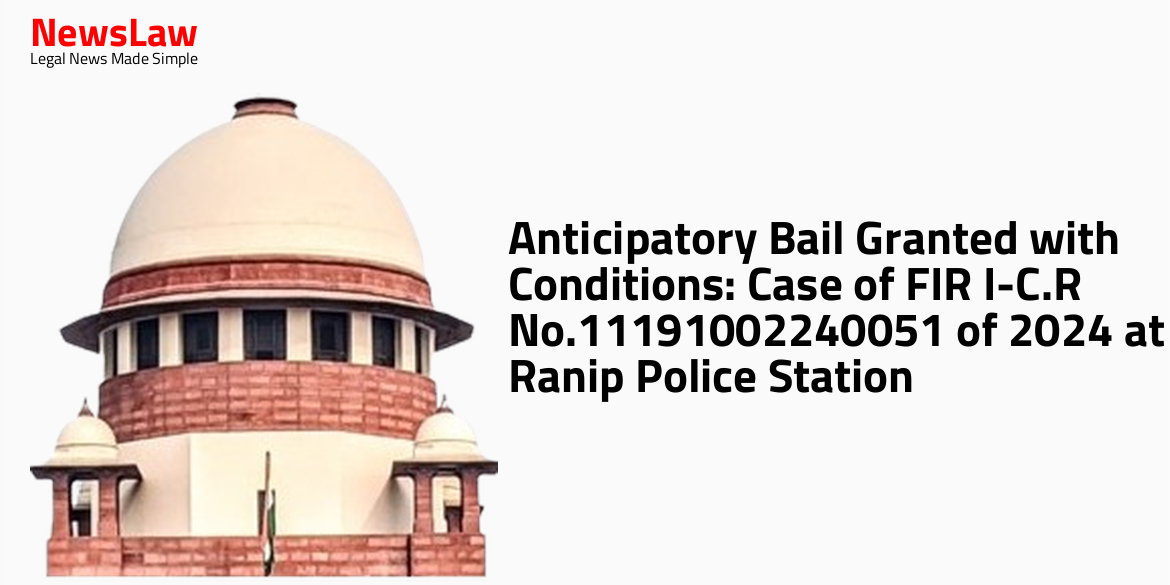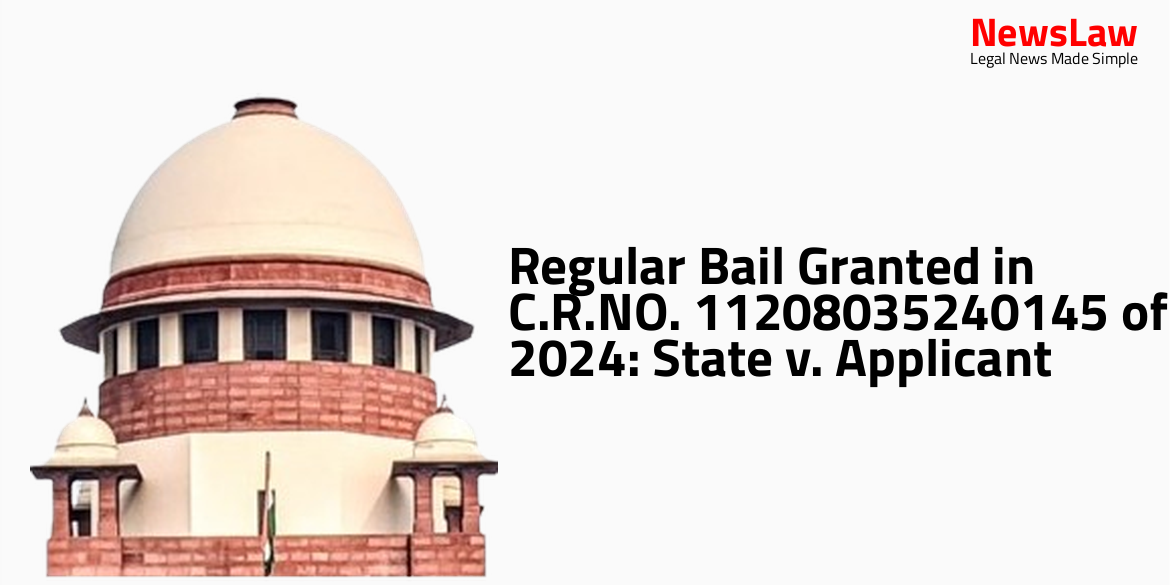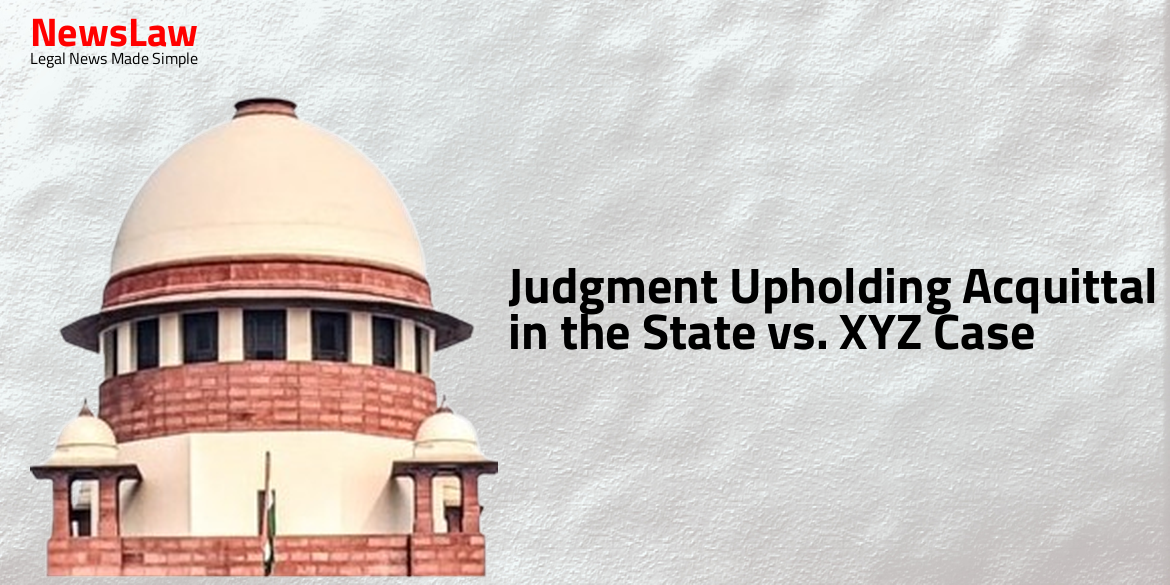In a significant legal judgment, the Gujarat High Court has nullified the detention order under the Gujarat Prevention of Anti-Social Activities Act, 1985. The case involves a detenue challenging the detention order, highlighting the crucial aspects of preventive detention and the protection of personal liberty. The court’s decision sets a precedent in ensuring the lawful application of preventive detention powers. Stay tuned for a detailed analysis of the case.
Facts
- The detention order dated 25.01.2024 was challenged by the petitioner under the Gujarat Prevention of Anti-Social Activities Act, 1985.
- The petitioner was detained by the detaining authority under Section 3(1) of the Act.
- The petitioner is considered a detenue as defined under Section 2(c) of the Act.
Arguments
- Detention order solely based on registration of two FIRs under Sections 379 and 114 of IPC.
- No nexus between alleged illegal activities and maintenance of public order.
- Detenu released on bail for all offenses, detaining authority did not consider this.
- No material to indicate detenu as a threat to society disrupting public order.
- Insufficient evidence apart from witness statements and FIRs to show breach of public order.
- No evidence that detenu’s activities affected social fabric or posed a threat to existence of normal life.
- Criminal cases did not disrupt social apparatus governed by rule of law, thus not disturbing public order.
- The APP for the respondent-State supported the detention order
- Sufficient materials and evidences were found during investigation and supplied to the detenue
- Detenue is in the habit of activities defined under Section 2(c) of the Act
- The detaining authority rightly passed the order of detention
- The subjective satisfaction of the detaining authority is found to be not legal and valid
- Allegations in the FIRs do not relate to public order as required under the Act
- Other relevant penal laws are sufficient to address the situation
- Allegations against the detenue are not relevant to Section 2(c) of the Act
Analysis
- Preventive detention is an exceptional and draconian power that should not infringe on personal liberty unjustly.
- Article 22 of the Constitution safeguards against the misuse of preventive detention and ensures fair procedures.
- Preventive detention should not be a substitute for ordinary criminal law procedures.
- Preventive detention must be based on valid grounds and not merely on apprehensions or surmises of the detaining authority.
- The distinction between ‘law and order’ and ‘public order’ is crucial in determining the necessity for preventive detention.
- Acts affecting public order must impact the community at large, not just specific individuals.
- The power of preventive detention should be used cautiously and only when there is a real threat to public order or security.
- The misuse of preventive detention powers has been noted by the courts, indicating the need for fair and lawful application of such powers.
- Preventive detention law is not the proper remedy in this case.
- The Supreme Court has quashed over five detention orders under the Telangana Act of 1986 in the last five years due to incorrect application of the standard for maintenance of public order and reliance on stale materials.
- The offences alleged could be punished under the Andhra Pradesh Prohibition Act, not through preventive detention laws.
- State has the option to seek cancellation of bail or move an appeal to the Higher Court if the detenu is considered a menace to society.
- Preventive detention is limited to a year and cannot be used for perpetual custody without trial
- Human freedom is paramount and cannot be restricted unless extremely necessary and affecting public order
- Detention orders must comply with the provisions of Articles 21 and 22 of the Constitution of India
- Article 22 must be seen as an exception to Article 21 and can only be applied in rare cases
- Authorities must demonstrate that the detention is in accordance with established legal procedures
- Simplicitor registration of an FIR does not necessarily imply a breach of public order
- Detaining authority must have relevant and cogent material to invoke the power under the Act
Decision
- The present petition is allowed.
- The impugned order of detention dated 25.01.2024 is quashed and set aside.
- The petitioner, who is the detenue, is ordered to be set at liberty forthwith, if not required in any other case.
- The rule made absolute to the extent mentioned above.
- Direct service is permitted.
Case Title: JAKIR S/O HUSAIN SAIYED Vs. STATE OF GUJARAT
Case Number: R/SCA/2260/2024



